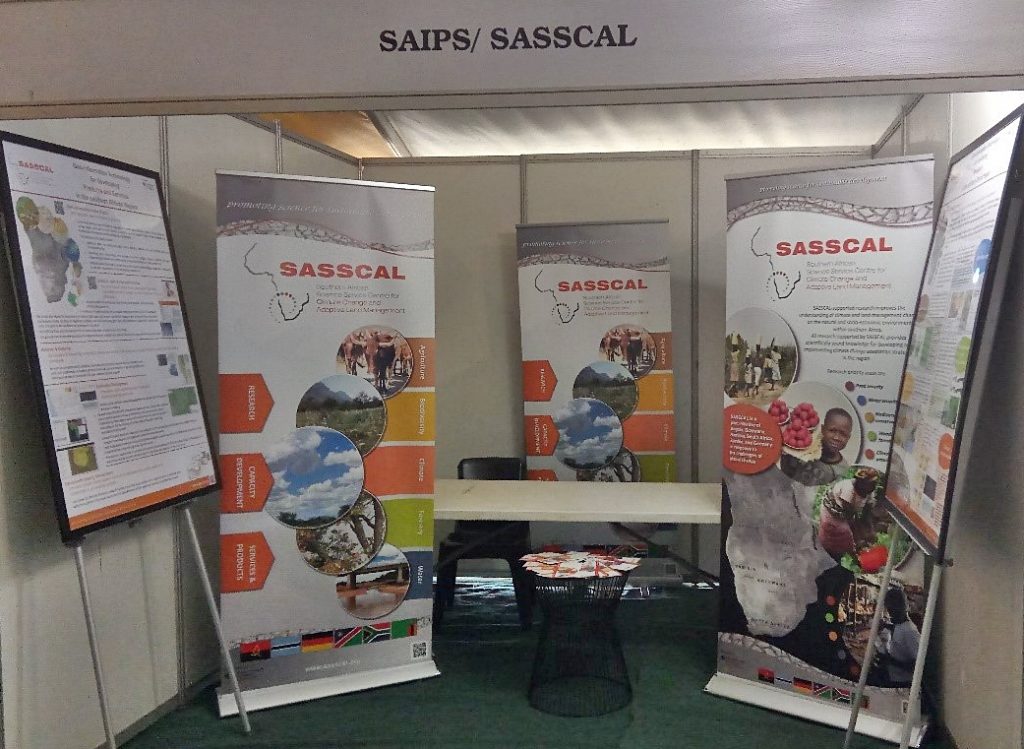The 3rd Annual SADC Industrialisation week was held in Windhoek from 30 July to 1 August under the theme ‘Promoting infrastructure Development and Youth Empowerment for Sustainable Development’.
The Industrialization Week theme is directly aligned to SASSCAL’s strategic objectives which are Research, Capacity Development and the Provision of Services. Through its research objective, SASSCAL targets the youth to conduct, not just demand driven research, but innovative and relevant research that will have an impact on sustainable livelihoods. The youth can participate in this research through various platforms including Graduate programmes (see info box below) that were developed with key leading regional Universities, and moreover will be addressed further through the second SASSCAL research call, SASSCAL 2.0, that will be announced soon.
SASSCAL has contributed to regional youth capacity development through SASSCAL 1.0 (2012 to 2018), which registered a significant number of young scientists graduating at various levels from Bachelor degrees to PhD degrees. To nurture these young scientists, SASSCAL is in the process of establishing its Alumni structure, to ensure that these scientists continue to receive support and mentorship in their career development.
SASSCAL, in collaboration with leading regional Universities, developed and accredited the following MSc programmes:
- Applied Science on Earth Observation, Geographic Information Systems and Remote Sensing (accredited for University of Zambia, Namibia University of Science and Technology, University of Botswana, and Cape Peninsula University),
- Applied and Environmental Geology (collaboration between University of Namibia and the Federal Department for Geosciences and Natural Resources),
- Dryland Forestry at University of Stellenbosch (in cooperation with University of Namibia and University of Botswana), and
- Diploma courses on Meteorology and Climatology as well as on Climate Change awareness at the Zambia Air Services Training institute (approved by TEVETA in 2016).
As a result of the academic training supported by SASSCAL, 137 students graduated within the SASSCAL research projects by the end of 2016. More than 250 students in total were registered with SASSCAL by the end of 2016 (SASSCAL AND Non SASSCAL funded). By April 2018, registered a total of 6 PhD, 52 Master and 38 Bachelor and Honours graduations. Many are still studying.
The Industrialization week was hosted by the Namibian Government, through the Ministry Industrialisation, Trade and SME Development. Honourable Tjekero Tweya, the Minister of Industrialisation, Trade and SME Development, in his opening speech, noted bluntly that governments have a tendency of developing policies that are inward looking and ignore regional integration. He challenged researchers to inform such policies with scientific knowledge products. Researchers need to and must be innovative and creative in their approach and ensure that their work is relevant. Honourable Tweya then criticised researchers for re-inventing the wheel by reproducing research that was conducted many years ago already. He further challenged researchers and policy makers to change their mindsets and think differently, as it is the only way to expect and attain different results. For regional industrialization to be realised, the Minister noted the need for innovative and creative research. Honourable Tweya emphasized the importance of regional integration through industrialisation, as it is a key driver that will enable the youth to have faith in the region.
The Minister of Industry and Trade, Honourable Tjekero Tweya applauded Exhibitors at the 3rd Annual SADC Industrialisation week for their stands. This was the first exhibition during the Industrialization weeks with more than 130 exhibitors in attendance. SASSCAL hosted its exhibition stand during the week. The stand attracted delegates from various SADC countries and provided a platform for interaction and networking.

The Industrialisation week’s discussions, which were robust, frank and sometimes heated culminated in a Forum Declaration that was received by the SADC Director Mr Tapiwa Samanga. The declaration will be submitted to the SADC Heads of States summit for deliberations. The SADC Heads of States summit will be held in Windhoek on the 17th of August 2018 and Namibia will take over the Chairmanship of the regional body. Some of the highlights of the declaration include:
- The need for private sector to develop capacity for youth development (SASSCAL has fulfilled this call through SASSCAL 1.0 and will continue developing the regional youth capacity through SASSCAL 2.0)
- The need to increase development research to advance knowledge generation (SASSCAL has received not only regional but also international recognition for its knowledge generation products and SAASCAL funded peer reviewed publications)
- The need to facilitate and support implementation of the declaration (SASSCAL is well suited and positioned to support implementations of the declarations that fall within its operational mandate)
In her closing remarks the Deputy Minister of Industrialisation, Trade and SME Development, Hon. Lucia Iipumbu noted that the Week’s deliberations touched on much needed discussions. She highlighted that Africa, in general, and SADC in particular, has acute infrastructure shortages and thus prompting the urgent call and need to mainstream infrastructure development in the region. She concluded by stating that as Namibia assumes the SADC Chairmanship, youth empowerment should take a centre stage to ensure sustainable development.




